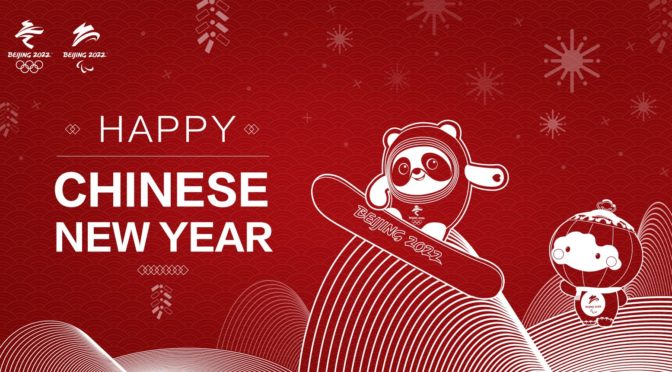With 51 weeks to go until the 2022 Olympic Winter Games in Beijing, we’re on the eve of the Lunar New Year here in China, which means we’re about to enter the Year of the Ox, but – perhaps more importantly – we are leaving the Year of the Rat behind. That’s because Rat years are often associated with disaster and bad luck – with the massive Sichuan earthquake in 2008 and COVID-19 being the two most obvious examples from the past two Rat years.
While Beijing has been marking the one-year countdown (see more below and last week’s recap), given that there’s been little sporting action to discuss, talk of a boycott has been gathering pace overseas. I’m not going to offer any thoughts on whether or not a boycott should happen – there are plenty of far more qualified people on both sides of the equation already doing that – but my own analysis of the evidence today is that a Beijing Olympics boycott won’t happen.
Quite simply, the Europeans, which includes a sizable number of major winter sports nations, don’t seem to be interested in a boycott, and, while opinion of China in the US – both among the public and government – appears to be at, or near, an historic low, a solo boycott could easily backfire on Washington and come across as a toothless protest from a petulant nation. Canada could conceivably join, though the situation there is complicated by the respective detentions of Meng Wanzhou and the two Michaels, but there seems to be more excitement there about the prospective return of NHL players to the Olympics (see more below) than there is talk of a Beijing Olympics boycott.
We saw something similar in the lead up to 2008, with protests dogging the international leg of the torch relay, and talk of how protests at the Games themselves would be handled. But once the Games got underway, all of that quickly fell to the side, and was replaced by the sporting action. That said, there are 51 more weeks for people to make their voices heard – and plenty of outlets available for them to do so – and so, even if no Beijing Olympics boycott materializes, this issue will continue to have legs for a while (in international media, at least). See also: U.S. signals no plans to boycott 2022 Beijing Winter Olympics after genocide designation [Reuters]
Weekly Roundup
- Ice hockey is the blue riband event of any Winter Olympics, but NHL players were blocked from playing in Pyeongchang in 2018. Things look better for 2022 – but there still a long way to go.
- More coverage from Beijing’s one-year countdown event, at which the Olympic and Paralympic torches were revealed.
- Chinese New Year greetings from Beijing 2022.
- Other features and stories in the build-up to 2022.
The NHL’s Return?
Scott Burnside from The Athletic wrote this piece discussing whether NHL players would make a return to the Olympics after sitting 2018, concluding in this tweet “Yes. Maybe. Hopefully.”
For those who haven’t followed this issue, the crux is pretty simple: players want to be there, because it’s still considered the pinnacle of their sport when it comes to international play; and fans want to see the very best players on the ice; but NHL owners don’t like – it means a three-week break to their season – or longer, if quarantine is still a factor by then – and they feel screwed if players return from the Olympics injured or out of form.
Of course, there is always a way to compensate each side, but it depends on how far the other will go to compromise. Significant progress was made last summer as the players and owners negotiated the contract to finish the season, with an extension to the existing CBA, or Collective Bargaining Agreement.
We know that a return to the Olympics, starting with the 2022 Games, was enshrined in the collective bargaining agreement extension ratified in July. It was a significant concession on the part of the owners who, in large part, hate the Olympics and the cost that comes with it, including shutting down the league midseason. “I’m dead set against the Olympics,” one owner told The Athletic on the eve of the signing of the new CBA. Another source closely tied to multiple Olympic Games and NHL ownership admitted he understands the angst that many owners feel about the Olympics. “They’re the only ones who don’t get anything,” the source said. “They’re the ones taking all the risks.”
So while things are looking far better than they did, there is still a lot to be done.
Olympic participation was included in the CBA, but does that guarantee we’ll see Alex Ovechkin and Sidney Crosby lining up across from each other in Beijing a year from now? The fact the NHL and NHL Players’ Association formalized a return to the Olympics means zero unless the two sides can square a number of significant details with the IOC. The IOC, led by president Thomas Bach, balked over the years at paying for things like insurance, transportation and accommodation costs for families; and allowing Olympic footage to be used to market and promote the NHL game and its players. It was why, in large part, the NHL did not go to South Korea. Still, multiple sources familiar with the dynamic among the IOC, NHL and NHLPA expressed optimism that the IOC will at least replicate conditions met for the Sochi Games in 2014, by agreeing to cover costs for those critical issues.
So, on balance, Burnside thinks it will get done. But one thing missing from this otherwise comprehensive piece is the degree of influence that China may have in this matter. China, remember, is in a group with Canada, USA and Germany. Canada (especially) and USA are always strong, while Germany has top end talent like Leon Draisaitl and Tim Stützle, and won Olympic silver in 2018 (when there were no NHL players).
And then there’s China, whose men are ranked 32nd in the world, when the Olympic tournament will feature just 12 teams. China has been trying to improve its team for years, looking to recruit the best North Americans with Chinese heritage. But those players are nowhere near the level of the NHL stars, and it’s looking increasingly unlikely that any of them will actually be naturalized in time to represent China at the Olympics. COVID has further delayed everything, both the speed of player development and any potential recruitment process.
Here’s the crux of it from a Chinese point of view: the best case scenario for a Chinese team going up against CAN, USA, GER – plus an additional powerhouse in the elimination rounds – is keeping the score to single figures. But right now, against teams packed with NHL players, that looks very unlikely. As a result, there’s very little reason for the hosts to want NHL players humiliating their own team on home ice. You can already imagine the headlines and none of them would go down well in Beijing. Of course, those headlines wouldn’t actually appear in Chinese media – as former CGTN sports anchor Jonas Gilbart remarked to me, “If a Chinese team loses 20-1, but it falls in a forest and only the rest of the world hears it, did it really happen?”
The biggest mistake that led us here was when the IIHF prematurely allowed China to qualify automatically as hosts, in the belief – or hope – that they would be able to fast track a competitive team on the ice by 2022. If you remove this prospective humiliation from the equation, China would love to have the prestige of the NHL’s return to the Olympics.
Sources within the Chinese hockey system say officials are insisting to the Chinese Olympic Committee that the current squad is good enough to compete, when they are quite obviously not, meaning that they may just plow ahead regardless, but you have to think someone on the inside is flagging this potential PR disaster.
But we’re back to the original question – will NHL players be at the Olympics next year? The players want in, the fans want them in, the IOC and IIHF want them in, and the NHL owners may grudgingly concede. So how much sway does China have on the whole issue? They may not be the main arbiters here, but their influence with the IOC isn’t zero. Keep an eye on this one.
Further reading: Canada has named its management team for the Olympics, and discussion has already turned to who the coach might be. Interestingly, the US team has said it will wait until participation is confirmed before making any announcements: Armstrong of Blues named Canada GM for 2022 Beijing Olympics [NHL], Five candidates to coach Team Canada at 2022 Winter Olympics [Sportsnet]
One-Year Countdown
Beijing unveiled the Olympic and Paralympic torches at its One-Year Countdown event last week, and the designs, which you can see in the picture thread below, are stunning:
After a quiet build-up to the one-year countdown, as highlighted in last week’s wrap, there was understated ceremony at the Water Cube venue – which will be renamed the Ice Cube for next year. IOC President Thomas Bach made a speech and invited the relevant NOCs to attend, with domestic media focusing on his remark that “our Chinese partners and friends will deliver spectacular Olympic Winter Games that will change the landscape of winter sport forever.” Our Chinese hosts will ensure safe and secure Olympic Games [Beijing 2022], Olympic torch unveiled in one-year countdown to Beijing 2022 [ Xinhua], BEIJING 2022 OLYMPIC WINTER GAMES: TOP THINGS YOU NEED TO KNOW {Olympic.org]
Others placed the Games in a wider context: China looks to Winter Olympics as chance for rare soft power win amid COVID-19, rights concerns [Reuters], Beijing braces for perfect storm of Olympic woes [Asia Times], New geopolitical fears surround 2022 Beijing Olympics [Axios]
Meanwhile, Global Times Editor Hu Xijin hit out on Twitter at countries threatening to boycott the Games. Take his comments with a certain amount of salt – he’s not an official, but he’s not a nobody either: ‘China will seriously sanction’ any country that boycotts Winter Olympics, says state-backed media chief [South China Morning Post]
Beijing 2022’s official New Year greeting

Other stories and links
- Eileen Gu, Kelly Sildaru, You Young, Dusty Henricksen, Kagiyama Yuma and Hirano Ruka all profiled in YOG STARS WHO COULD LIGHT UP BEIJING 2022 [Olympic.org]
- RECORD-BREAKING GREMAUD CHASING OLYMPIC IMMORTALITY IN BEIJING [Olympic.org]
- SKIING FINALLY “FUN” AGAIN FOR SWISS STAR SUTER AS SHE EYES UP BEIJING 2022 [Olympic.org]
- Legendary ski jumper Ammann eyes Beijing 2022 [Xinhua]
- French ice dancer Cizeron eyes gold at Beijing 2022 [Xinhua]
- NW China becomes winter haven for skiers [Xinhua]
- Winter Olympics transforming lives in north China town [Xinhua]
To keep up-to-date with all the latest news from China Sports Insider, please click on the “SUBSCRIBE” button in the top right corner of this page (or see below on mobile version or click here from email version). Also follow along on Twitter for regular updates.


